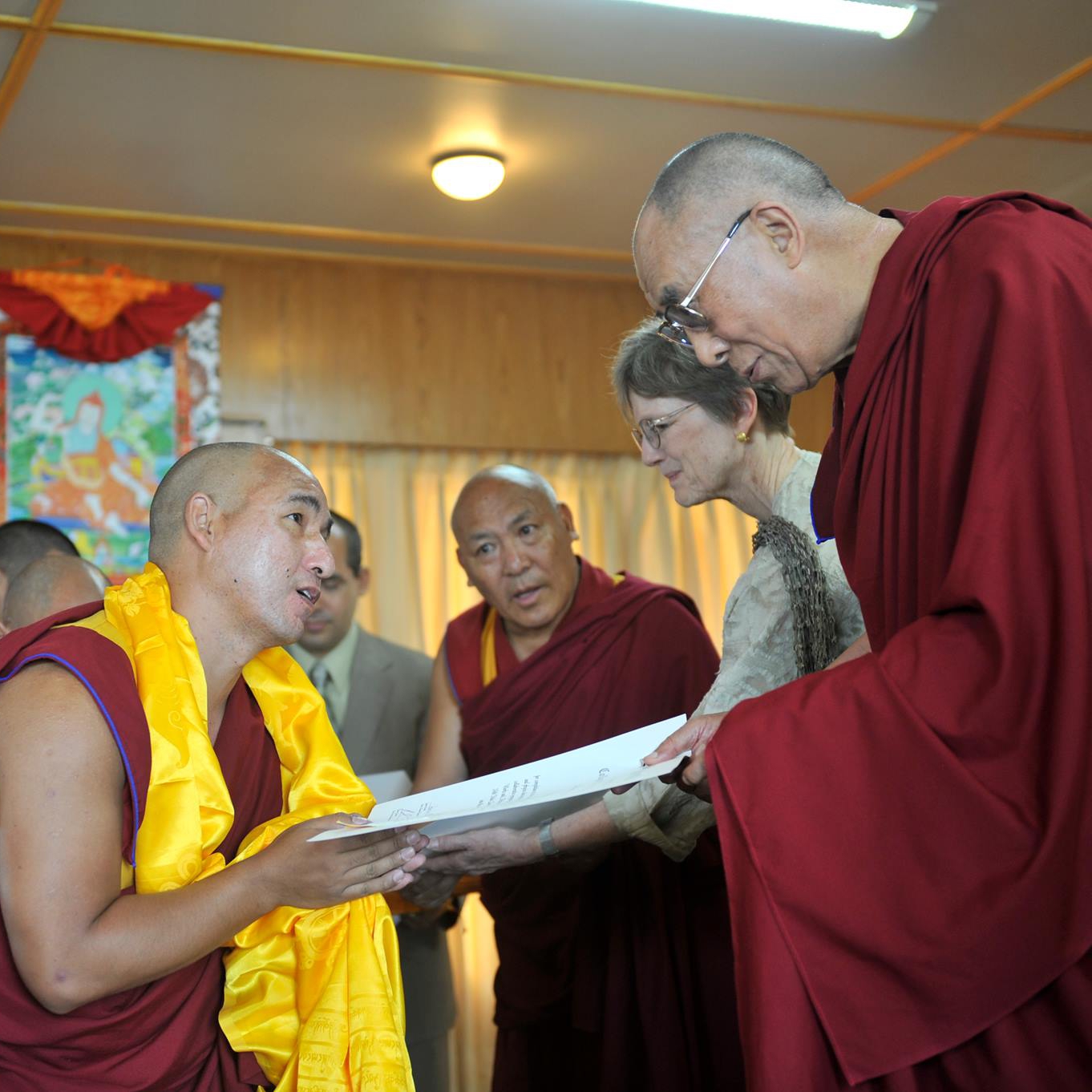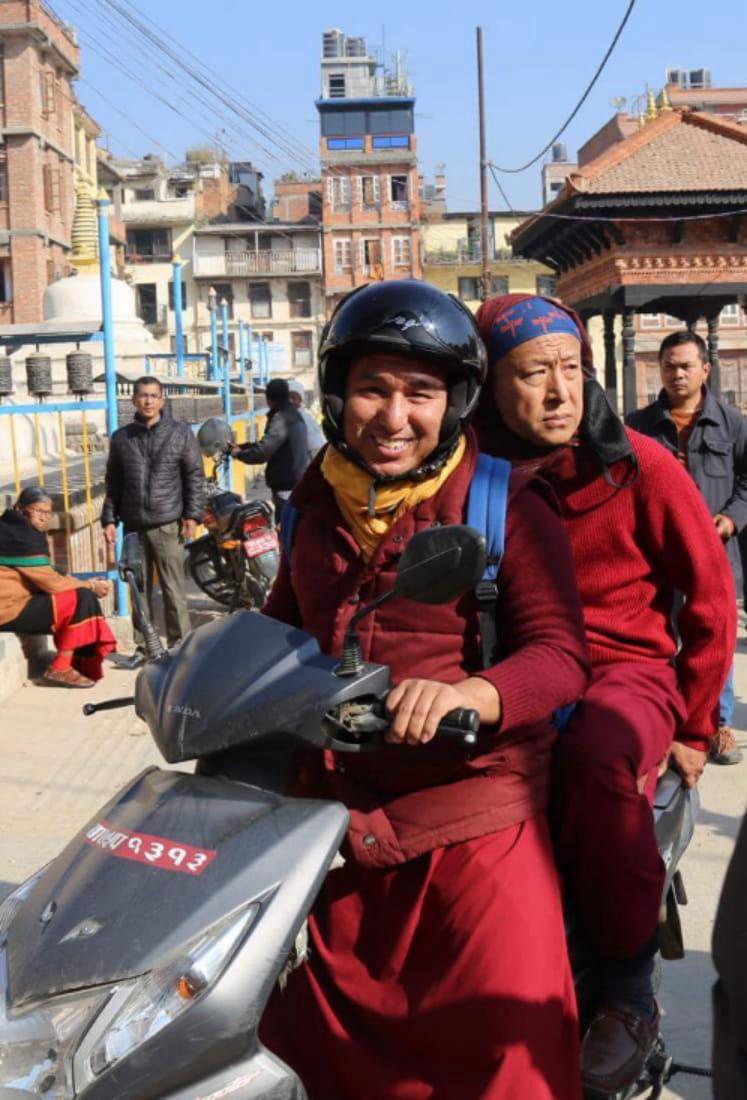The Cinematic Monk

Shelnang Mugum receiving recognition for his work from His Holiness the Dalai Lama

Daily life in Kathmandu: Shelnang navigating the bustling streets with a fellow monk
Monastic Life
Shelnang Mugum is a Nepalese independent filmmaker and Buddhist monk. He was born into a Mugum (Himalayan region) community in rural Nepal and joined a monastery at a young age – an experience that profoundly shaped his life and his films. He undertook traditional monastic education, earning a Khenpo degree in Buddhist philosophy (a non-academic equivalent of a graduate degree).
As part of his monastic service, he teaches Tibetan language and Buddhist philosophy in monasteries across Bhutan, India, and Nepal. He is based primarily at Shechen Monastery in Boudha, Kathmandu, Nepal (founded by Dilgo Khyentse Rinpoche), where he serves in the administration and as a teacher. This deep monastic background provides Shelnang with a rich spiritual perspective and disciplined work ethic that he brings to his filmmaking.
Journey into Cinema
His journey into cinema began within the monastery walls. An avid movie lover since childhood, he recalls being "enthralled" by films and recognizing their power to move people. After completing his formal studies, he worked as a liaison for media and film crews that visited Shechen Monastery. In this role, he coordinated on-site shoots and assisted filmmakers, gaining firsthand exposure to the filmmaking process.
This sparked his ambition to make his own films, even though the prospect felt "so complicated" at first. A turning point came when renowned Buddhist lama and filmmaker Dzongsar Khyentse Rinpoche (Khyentse Norbu) learned of his interest and offered him a scholarship to attend a film workshop. With the blessing of his monastic teachers (including Shechen Rabjam Rinpoche and Khyentse Yangsi Rinpoche), he enrolled in the Himalayan Film School – a one-week intensive course at Deer Park Institute in Bir, India, taught by Indian filmmaker Ankit Pogula. This brief formal training boosted his confidence and skills, setting him on a new path.
First Steps as a Filmmaker
After returning, he made his first short film (a 7-minute story about a monk and a blind person), which he now regards as a learning experiment and chooses not to publicly screen. In April 2015, a devastating earthquake struck Nepal, an event that deeply affected him and the young monks in his care. Hearing that some of his young students were "homesick" and longing for their families after the disaster, he conceived an idea for a feature-length film to portray their experience and the monastery's relief efforts.
However, Nepal's film regulations required new directors to first prove themselves (either by making two short films, assisting on a feature, or earning festival accolades) before directing a feature. Determined to tell his stories, he pivoted to short films as a stepping stone. This decision led to the creation of "Jha Lo" (Year of the Bird) – the short film that would launch his filmmaking career.
Influences and Inspirations
His Buddhist upbringing is at the core of his creativity. He has described filmmaking as a form of spiritual practice – a way to explore inner emotions and truths. His films are a medium for confession, catharsis, and healing. His key inspirations include his monastic teachers and Dzongsar Khyentse Rinpoche.
He also grew up watching popular Nepali and Bollywood films, which initially shaped his cinematic sensibility until refined by mentors like Abinash Shah and Min Bham. His style blends poetic realism with accessible storytelling.
Critical Reception and Legacy
Critics praise his sincerity and storytelling. His films are seen as authentic and emotionally resonant, often compared to spiritual or poetic cinema. His unique life story enhances the reception of his work, but the films stand strong on artistic merit. He is viewed as a rising figure in South Asian cinema, bridging spiritual heritage and modern art.
"My films are a reflection of my journey – from the monastery to the world of cinema. I try to bring the mindfulness and compassion I learned as a monk into my storytelling, creating films that not only entertain but also heal and transform."
— Shelnang Mugum
Current Projects
Shelnang is currently developing his first feature film, drawing on his unique perspective as a Buddhist monk and filmmaker. He continues to collaborate with other Nepalese filmmakers while maintaining his connections to the monastic community that shaped him.